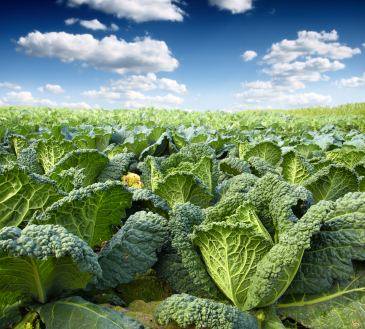What will the New Agriculture look like?
 Sunday, May 6, 2012 at 09:11AM
Sunday, May 6, 2012 at 09:11AM  Kale field. Image: istockphotoIn the recent article published in Scientific American, Will Organic Food Fail to Feed the World?, David Biello begins by describing the impact of modern agriculture on global ecosystems:
Kale field. Image: istockphotoIn the recent article published in Scientific American, Will Organic Food Fail to Feed the World?, David Biello begins by describing the impact of modern agriculture on global ecosystems:
Food for hungry mouths, feed for animals headed to the slaughterhouse, fiber for clothing and even, in some cases, fuel for vehicles—all derive from global agriculture. As a result, in the world's temperate climes human agriculture has supplanted 70 percent of grasslands, 50 percent of savannas and 45 percent of temperate forests. (emphasis added)
To determine if organic agriculture alone could feed the world, Verena Seufert of McGill University in Montreal and her colleagues “performed and analysis of 66 studies comparing conventional and organic methods across 34 different crop species.” From the study, Comparing the yields of organic and conventional agriculture, published last month in Nature:
Our analysis of available data shows that, overall, organic yields are typically lower than conventional yields. But these yield differences are highly contextual, depending on system and site characteristics, and range from 5% lower organic yields (rain-fed legumes and perennials on weak-acidic to weak-alkaline soils), 13% lower yields (when best organic practices are used), to 34% lower yields (when the conventional and organic systems are most comparable). Under certain conditions—that is, with good management practices, particular crop types and growing conditions—organic systems can thus nearly match conventional yields, whereas under others it at present cannot. (emphasis added)
At the end of the Scientific American article, Seufert concludes:
Current conventional agriculture is one of the major threats to the environment and degrades the very natural resources it depends on. We thus need to change the way we produce our food. … Given the current precarious situation of agriculture, we should assess many alternative management systems, including conventional, organic, other agro-ecological and possibly hybrid systems to identify the best options to improve the way we produce our food. (emphasis added)
 Verena Seufert,
Verena Seufert,  organic farming,
organic farming,  organic food in
organic food in  Agriculture
Agriculture 

Reader Comments